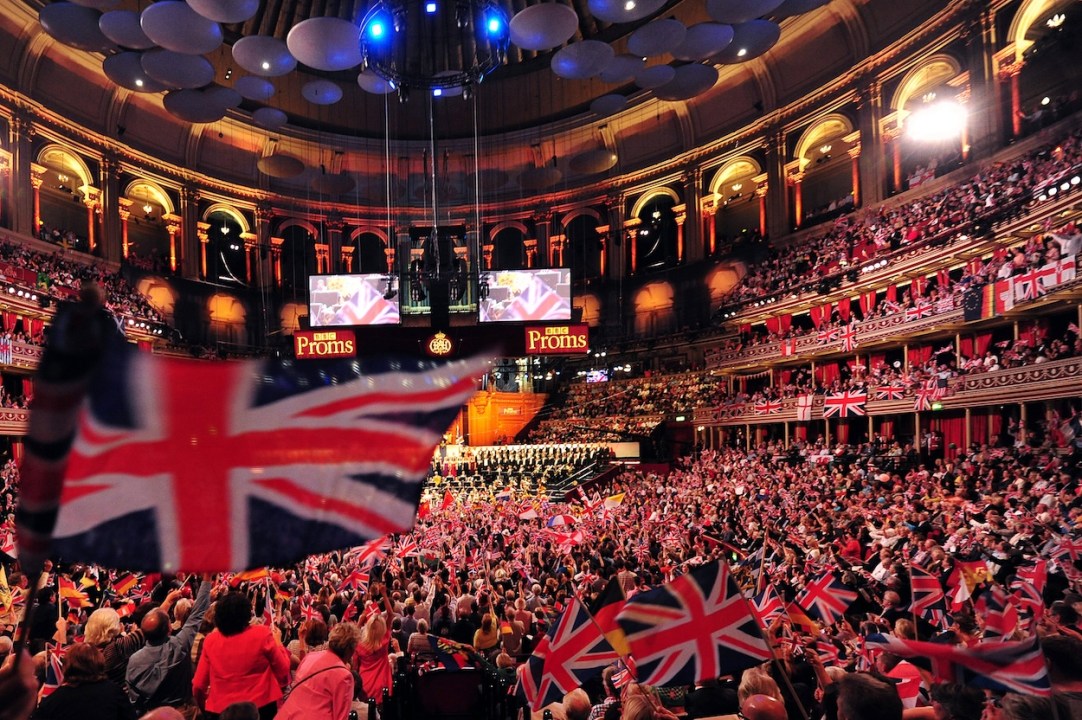We’re approaching the home straight at the Proms. There are three weeks to go at the world’s greatest festival of music, and Prommers are counting down the days until the famous orchestras of Berlin, Munich and Prague reach the Royal Albert Hall. The friendly foreign invasion has become the traditional climax to eight weeks of music-making.
It’s been a better season in the hall than the one which appeared on paper, though the opening night was vin ordinaire. Clara Schumann’s pretty piano concerto turned out to be pretty dull. It’s not a piece that should open a festival of this pedigree. The pianist was a poor choice, too, but we shall come to Isata Kanneh-Mason anon.
The BBC, which sponsors the Proms, is a driver of cultural relativism
The Hallé, however, gave ‘the Kensington Bowl’ one of its unforgettable nights. The Manchester orchestra, saying goodbye to chief conductor Mark Elder after 24 years, paired Mahler’s Fifth Symphony with a new choral work by James MacMillan, Timotheus, Bacchus and Cecilia. It was a corking Prom. And Daniel Barenboim, seriously ill, brought his West-Eastern Divan musicians, Arab and Israeli, who supplied a reassuringly old-fashioned programme of Brahms and Schubert.
I’m blowing out candles this summer because it is 40 years since I attended my first Prom. On 9 September 1984 I queued for four hours to hear the Vienna Philharmonic play Beethoven and Schubert. In those days you had to queue to get a ‘promming’ place in the arena or the gallery. Now you are handed a numbered ticket if you want to stand. It may be a better arrangement, but it takes the sense of achievement out of queueing.
You met some interesting folk in that queue. The actor who said the only director worth his salt was Peter Gill. The saxophonist who slipped away for an hour to busk at South Kensington tube station. The France-domiciled Yorkshireman hungry for scores from the Test match (no smartphones).
It’s a less diverting cast these days. There were always show-offs and misfits. The ‘parrot man’, for instance, who strolled around the hall as Prommers arrived, showing pictures of his favourite bird, and the chap who brought along a collection of teddy bears. But the collegiate sense has hardened into something less agreeable. There are too many hardliners wearing T-shirts demonstrating loyalty to causes, and the only cause worth supporting at the Proms is music.
On the first night last month there was an unmistakable sense that ‘we’ have gathered one more time, as though it was a ritual open only to the elect. There are fewer misfits and plenty of men and women who seem genuinely touched. You wonder what sustains them for the other ten months of the calendar.
There will always be changes over four decades, and the Proms has not been untouched. There are more women conductors, sometimes, it has to be said, for decorative purposes, and the range of music has expanded. The Stephen Sondheim Prom in 2010, which honoured the American’s 80th birthday, is in the annals. A personal favourite is the appearance of Roby Lakatos, the Hungarian gypsy fiddler, at a late-night Prom in 2001.
But there are now too many Proms that should not have been scheduled. This summer, ten concerts are not classical, which is about five too many. Do we need a ‘disco Prom’? No, we do not. Last year’s Northern Soul Prom turned out to be a big success. All the more reason, therefore, not to seek a repeat. The Nick Drake tribute, to an overrated songwriter who died 50 years ago, was also ill-judged.
It’s all window-dressing. The BBC, which sponsors the Proms, is a driver of cultural relativism, where words like ‘diversity’ and ‘inclusion’ dominate. As the story of western music has largely been written by dead white European men, this tradition presents a problem.
There must be more women composers, which is why the season opened with Clara, rather than Robert, Schumann. And there have to be more black musicians, which is welcome so long as they are good. Isata Kanneh-Mason is talented, certainly, but the fear is that she is being pushed too hard by those who, with noble intentions, are serving purposes that are not musical. The Kanneh-Masons are a remarkable family. They should not be employed as regimental goats, trotted out, as they were this year, all seven siblings.
This altered state is even more apparent in the television coverage. Anyone watching the Proms on BBC4, which likes to feature the non-classical evenings, might imagine the festival is a multicultural feast. The presenters, led by the ubiquitous Clive Myrie, talk of ‘gigs’ and ‘crowds’. Georgia Mann has even referred to ‘hits’ by Wagner and Mahler. And let’s not start on Katie ‘Amazing’ Derham, whose uncritical world is chock-full of ‘superstars’. We’ve come a long way from the days of Richard Baker and James Naughtie, genuine lovers of music, who never felt the need to patronise viewers.
Yet each night somebody is hearing a masterpiece for the first time, which means the Proms is a force for good. There are bad nights, when the happy clappers intrude between movements (an offence surely punishable by an hour in the stocks), but they are outnumbered by those evenings of joy, when a performance takes off, and 5,000 people share the most delightful experience of all: transfixed silence. At such times the Royal Albert Hall feels like the most comforting place in a restless world.








Comments